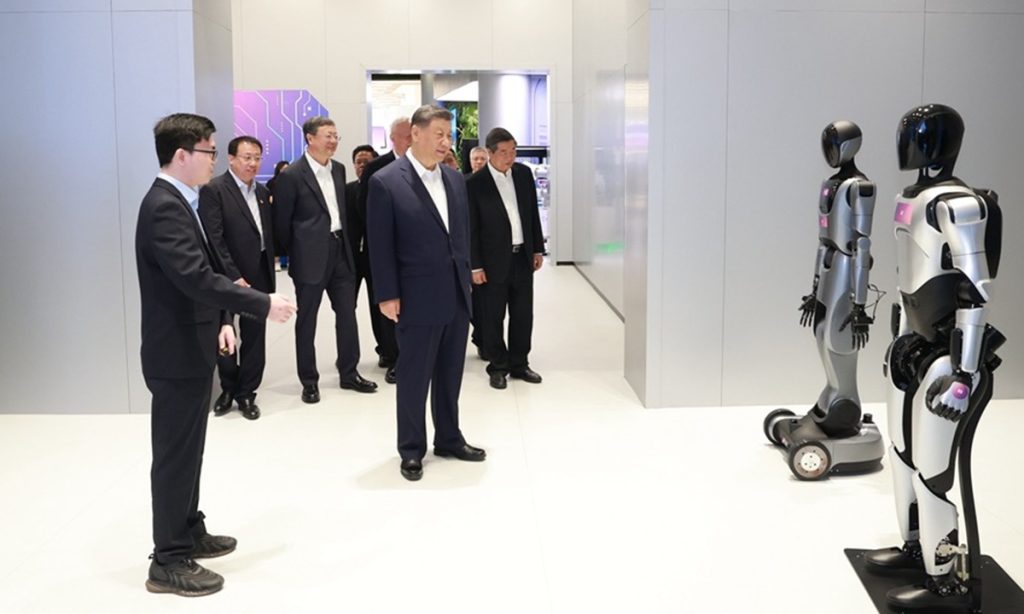Xi inspects Shanghai large-model incubator, underscoring China's AI ambitions

Chinese President Xi Jinping on Tuesday visited an AI incubator in Shanghai, calling on the city to take the lead in AI development and governance. The inspection trip came four days after China's leadership convened a dedicated AI study session, where Xi called for gaining a head start in this strategic sector, the Xinhua News Agency reported.
"AI technology is evolving rapidly and entering a phase of explosive growth," said Xi, also general secretary of the Communist Party of China (CPC) Central Committee and chairman of the Central Military Commission, as he visited the Shanghai Foundation Model Innovation Center, a large-model incubator home to over 100 enterprises.
During the group study session of the Political Bureau of the CPC Central Committee last Friday, Xi pointed out that AI, as a strategic technology leading the new round of sci-tech revolution and industrial transformation, has profoundly changed the ways people work and live.
The Party Central Committee attaches great importance to the development of AI, and has improved top-level design and strengthened implementation efforts in recent years, Xi said at the session.
"The great importance the Communist Party of China Central Committee attaches to the development of AI fully reflects the strategic positioning of AI in the new round of technological revolution and industrial transformation," Zhang Xiaorong, director of the Beijing-based Cutting-Edge Technology Research Institute, told the Global Times on Tuesday.
President Xi's remarks are encouraging for the AI development in China, especially calling on Shanghai to undertake the historical mission of building into a globally influential tech innovation center so as to develop innovation advantage across the country at an early date and develop new quality productive forces according to local conditions, Chu Jianxun, a research expert on the national innovation ecosystem and professor at the University of Science and Technology of China, told the Global Times on Tuesday.
In the incubator in Shanghai, Xi joined a salon themed on the autonomous evolution of next-generation intelligent agents, engaging in discussions with young innovators on the spot, Xinhua reported.
"AI is a nascent industry, and it's also an industry that belongs to young people," said Xi.
He then walked into an AI product experience store, where he inquired in detail about the functions and market trends of the products, and tried on a pair of smart glasses for a firsthand experience.
President Xi's remarks chart a clear path forward for us to carry out AI innovations and practices, which also strengthens our confidence and resolve to improve social wellbeing and boost industrial upgrade through technologies, Xu Li, chairman and CEO of Shanghai-based AI software company SenseTime, who attended the salon, told the Global Times on Tuesday.
"As a large language model (LLM) startup, we feel greater confidence. We also deeply understand the great importance of AI technological innovations for economic and social development," Yan Junjie, founder of Shanghai-based AI unicorn MiniMax who also attended the salon, told the Global Times on Tuesday.
Currently, AI innovation is accelerating on a global scale and is expected to drive societal transformation with an unprecedented depth and breadth, significantly enhance the efficiency of various industries, boost the development of new quality productive forces and elevate global collaboration to a new height, Yan said, noting that "I firmly believe that Chinese LLM firms have ushered in opportunities."
Accelerating tech innovations
China has made strides in boosting sci-tech innovation and industrial upgrading in recent years, with its global ranking in innovation increasing markedly and strategic emerging industries taking up a larger share of the national economic output, according to Xinhua.
Since the beginning of 2025, from DeepSeek, the rising star in AI, to Unitree Robotics, a pioneer in humanoid robot development, and the creative force behind the animated blockbuster Ne Zha 2, there have been significant structural advancements in China's technology innovations.
"China has institutional advantages and abundant talent for the development of new quality productive forces," Li Changan, a professor at the Academy of China Open Economy Studies at the University of International Business and Economics, told the Global Times on Tuesday.
In this regard, China should continue to strengthen basic research in the AI industry, with concentrated efforts to be made in making breakthroughs in core technologies including advanced chips and basic software, while efforts are also needed in integrating tech innovations with industry innovations, and strengthening basic education, Zhang said.
To unleash new quality productive forces, China has stepped up support for the growth of the private economy and private enterprises, deepened reforms in the scientific and technological system, as well as the education and talent systems, and removed barriers obstructing the development of new quality productive forces in recent years.
According to data released by the National Bureau of Statistics recently, the high-tech industry saw robust fixed-asset investment growth in the first quarter this year, with investment in aerospace vehicle and equipment manufacturing soaring by 30.3 percent, while investment in computer and office device manufacturing surged by 28.5 percent.
"The data underscores that the development of new quality productive forces has become an important force supporting the development of the national economy, which is also transforming and upgrading China's economic structure toward innovation economy," Li said, noting that China's development of new quality productive forces will also inject driving force into the transformation and upgrade of the world economy.
"Moving ahead, we will accelerate the innovation and application of multimodal LLMs. We will continue to improve the utilization efficiency of computing resources, boost the integration of LLM technologies with various industries and daily life faster and more efficiently, and accelerate scaled service and vertical ecosystem of AI industry so as to serve the daily needs of the public and contribute to Shanghai's development into a globally influential hub for tech innovations," Xu said.
China has abundant data resources, a complete industrial system, vast application scenarios and huge market potential, Chu said, expressing full confidence in China's economic prospects.